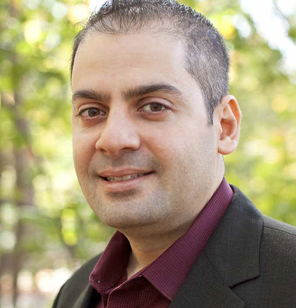You have /5 articles left.
Sign up for a free account or log in.

Abdulkader Sinno
IU Bloomington
An associate professor of political science at Indiana University at Bloomington told graduate students that he can’t serve as the department’s job-placement director any longer, as he refuses to participate in the “official department charade.”
“Dear graduate students,” the professor, Abdulkader Sinno, emailed students, “I’m resigning because I don’t want to be complicit in keeping you in a Ph.D. program that doesn’t help your advancement. The department needs graduate students to cheaply teach or assist in teaching its undergraduate students, and for faculty to keep claiming that we have a serious Ph.D. program. I just don’t believe that you should pay for their needs with your livelihood.”
Faculty members, Sinno continued, “are perpetuating the myth that a Ph.D. from a modest department like ours can be a reliable route to middle-class life. It is not anymore.”
Warning of a looming recession that could further contract the poor faculty job market, Sinno urged students who maintain hope for faculty jobs to “transfer to a top-15 department to improve your odds of having a fulfilling academic career by an order of magnitude.”
He also described a former student who left the program with a master’s degree who is now making six figures at a tech firm, saying, “There are of course some situations where a Ph.D. from our department could help your advancement. If you have a job guaranteed in your country of origin, or if you feel that this is the best route to a government job such as in the State Department. Even though an M.A. would work just as well and will likely land you in the same pay bracket.”
The letter, which has been circulated on social media, is provoking strong—and mixed—reactions.
In his brush with virality, Sinno has been lauded as “heroic” and the kind of professor some Ph.D.s wish they’d had.
“I wish my advisor had done this for me,” one observer wrote on Twitter. “But no. They told me that yes, the job market is dire. Yes, there is a problem with the over production of PhDs. But I personally was special. I was so good, so self evidently talented, I’d be ok.”
A writer and information technology specialist who graduated from IU’s communication and culture Ph.D. program in 2012, who asked that his name not be used for this article, said, “I wish I’d seen anything like this when I was doing my Ph.D. at IU. The worst-case scenario was always presented as, ‘Well, you might not be able to get the exact type of academic job you want when you graduate.’”
A few commenters said they appreciated Sinno’s attention to how prestige hiring among elite departments limits opportunities for others, in particular.
Things look different within Sinno’s department, however. To some, his comments were read as dispiriting and not quite fair, even before they became public.
The Quiet Part Out Loud?
Michael McCarthy, a second-year graduate student in the department who posted Sinno’s letter to Twitter, told Inside Higher Ed Tuesday that while he agrees with much of Sinno’s job market analysis, he doesn't believe Sinno was exposing a charade.
“I think they have said it out loud,” McCarthy said of his program’s general stance on the job market. “When they were first recruiting me to this program, they were telling me, ‘You know, job market numbers aren’t great. You’re sort of joining at your own risk.’”
McCarthy said he hopes he lands a faculty job but that he’s prepared to look outside academe if not. What Sinno’s letter also fails to capture, he continued, is the poor job market he faced before enrolling in graduate school.
“Two years out of undergrad, I was struggling to find consistent work,” he said. “It was call center jobs and sales jobs and stuff that was sort of not related to political science, and I [also] had a degree in economics. It wasn’t really related to those fields, and felt sort of beneath my skill set. And I thought, ‘Well, I’ve always liked school. I’m still reading the sort of stuff that I would be reading if I was in grad school.’”
McCarthy said that the department’s director of graduate studies and its chair already have called meetings to discuss the letter and broader issues raised—including what the program is doing to prepare students for what’s ahead.
“There is some sense that people in this department are trying their best, that they are working in our interests, and they’re not trying to pull the wool over our eyes,” he said. “And I haven’t heard anybody say, ‘I’m going to drop out because of Prof. Sinno’s letter.’ It’s more that people are actually justifying why they’re staying in grad school, if anything.”
McCarthy has said on social media that one concrete way to help graduate students would be for the university to recognize their union. Graduate assistants at IU-Bloomington went on strike seeking recognition and collective bargaining rights in the spring, but the university refused to accede to these demands. Over the summer, the university offered them contracts that raised minimum stipends from about $18,000 to $22,000.
William Kindred Winecoff, associate professor and director of graduate studies in the department, said, “We’re not freaking out in [political science]. It would be good if this dies down soon for sake of our students’ mental health, but otherwise this has presented a good opportunity to continue talking with our students about the job market challenges, and opportunities, that they will face upon graduation.”
The reality, Winecoff said, “is that public universities are underfunded across the country, and that does have an impact on our students, particularly in the academic job market. This is not a surprise to anyone who has been following the trends.” IU’s political science department has for years now been offering graduate students programs that are more oriented toward nonacademic employment and networking, along with more traditional instruction, he also said.
Winecoff added that the department does not admit students “only to teach large-enrollment courses,” as it doesn’t allow students to teach such courses. All Ph.D. students in the program are funded, he said, and the program has cut seats to ensure this.
“We invest a lot in our students, especially in these challenging times. We know the challenges we are facing, and we are using this moment constructively, to come together as a department and support our students, some of whom are worried about how this [Sinno’s letter] may affect our institutional reputation, and thus their job market prospects.”
Asked about job-placement data, Winecoff said the department matriculates about six Ph.D. students per year, and that prior to the pandemic, a few tenure-track positions could be expected, “possibly a postdoc or [visiting assistant professorship] for another student or two. Then other graduates move into government or the private sector.”
The past two to three years have been less successful in terms of tenure-track placements, he said, but prospects seem to be improving for students currently on the market.
“So no, we are not regularly placing our students in tenure-track jobs at Harvard. But that is also not what our students expect, nor what we promise them.”
Sinno, who plans to remain a faculty member, just not a job-placement director, at IU, told Inside Higher Ed that he didn’t expect his note to 40 or so graduate students to get so much attention. In any case, he said, he’s been deeply concerned about the “limited opportunities our graduate students have since the 2009 recession that decimated the academic job market. The absolute majority of our Ph.D. students choose this path in the hope of becoming faculty members. We now find ourselves attempting to change their expectations midcourse and training them to find jobs in the private sector when they near graduation so they can have decent jobs.”
While there is “nothing wrong with either career path,” he continued, it’s a “problem” that so many graduate students spend five to nine years getting a Ph.D.s for jobs that don’t end up requiring that level of training.
“They would have been much better off pursuing a [master’s] or going straight to the private sector after college.”
Universities deserve blame, Sinno said, in that departmental websites may practice “false advertising” in the form of outdated placement data on websites and more.
“Matters are only going to get worse with public university budgets in distress and the infamous demographic cliff lurking around the corner,” he said. “We need to stop recruiting Ph.D. students based on false expectations. How do we do that? By advertising prominently on departmental websites up-to-date placement statistics within one year and five years of graduation. The data should be broken down by area of employment. The academic placements should be broken down by category—tenure-track, long-term lecturer, temporary, postdoc. That way 20- to 24-year-olds can make a better-informed decision about whether to invest five to nine years of their lives in a specific Ph.D. program.” (Sinno’s department website includes recent graduates’ job placements in academe by institution, but not by job type.)
Some programs with shaky recent placement histories “should consider putting recruitment on hiatus until market conditions change,” Sinno said—IU included.
As for why Sinno wrote so bluntly to graduate students directly, he said that he’s faced resistance from senior faculty members who are “not willing to consider that the apprenticeship model stops making sense when there are no suitable academic jobs for freshly minted Ph.D.s.” Moreover, he said, as an Arab American, “my voice as a minority faculty member is regularly sidelined in the context of the political science department by older white male scholars who are set in their ways. What the department is doing is unethical, and we simply need to address the matter. We can’t squander young people’s best years on a fool’s errand.”








